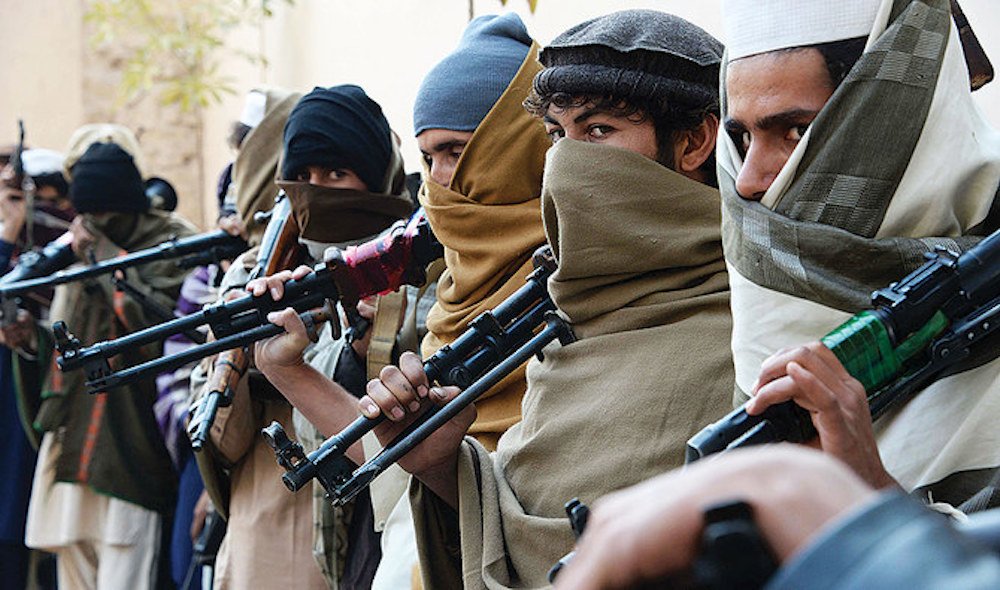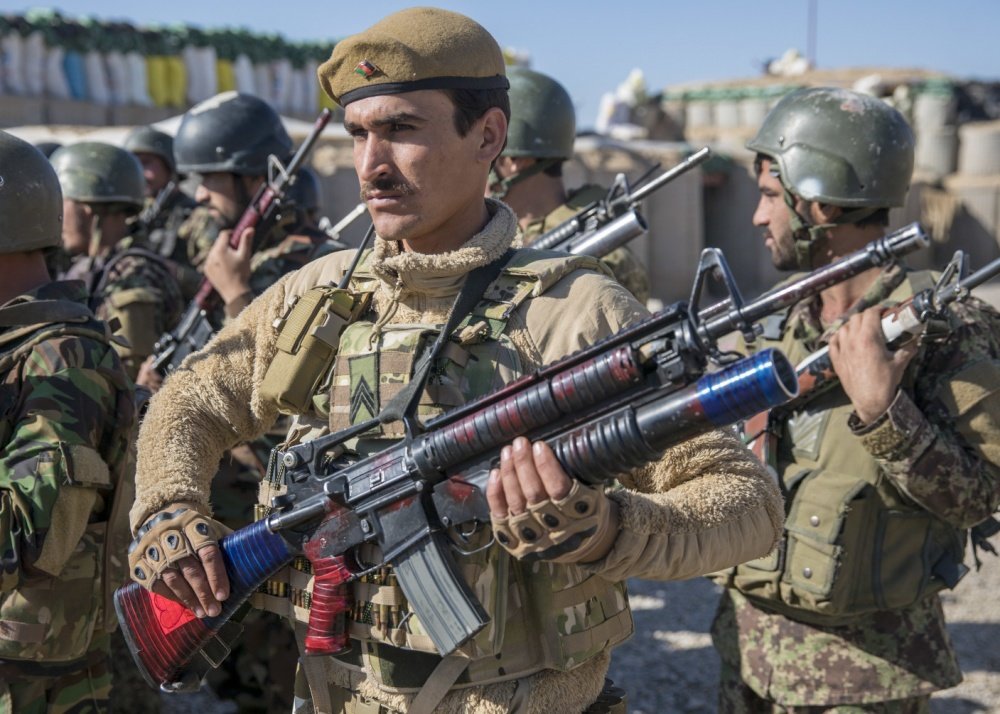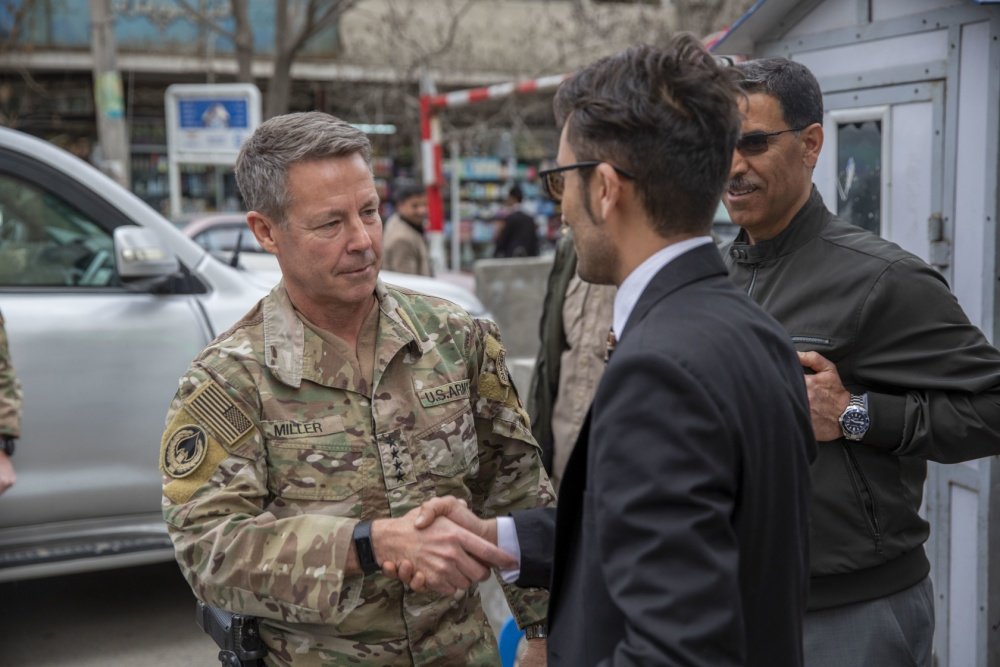
Former Afghan Taliban fighters are photographed holding weapons before handing them over as part of a government peace and reconciliation process at a ceremony in Jalalabad, Afghanistan, Feb. 8, 2015. Photo by Noorullah Shirzada/AFP, courtesy of Twitter.
As the saying goes: “Sometimes you eat the bear, and sometimes the bear eats you.” Well, for the 30 Taliban militants who died during a bomb-making workshop in Afghanistan on Saturday, the proverbial bear got the best of them.
The Afghan National Army’s 209th Shaheen Corps reported on social media that the accidental detonation took place at a bomb-making class held in a mosque in the village of Qultaq in Balkh province. Of the 30 fatalities, six were reportedly explosives experts from abroad who were leading the ill-fated workshop, the Afghan National Army said in several social media posts.
The Taliban militants had reportedly gathered in the village’s mosque with their foreign bomb-making gurus to learn the finer points of cobbling together homemade explosive devices. Needless to say, the class hit a snag.
“The incident was so powerful that the faces of foreign citizens were not recognizable,” the Afghan National Army said on Twitter.
It will always be a dream for the Taliban to bring our country to the brink.
They will always be a fallen regime and a dark spot in the history of our country.
#talliban_get_out_of_afghanistan@USFOR_A @ResoluteSupport @CesarBr69580052 pic.twitter.com/4U93YH0ebK— 209 Shaheen Corps (@Shahin209corps) February 15, 2021
The incident comes as violence escalates across Afghanistan amid stalemated peace talks and multiple defunct cease-fire bids. A top Afghan commander warned last week that the Taliban are planning a “major attack” in springtime, following the traditional winter lull in fighting.
Amid the uptick in violence, Taliban units continue to sustain heavy casualties at the hands of Afghanistan’s defense forces. According to Afghan defense officials, government military operations comprising ground and air units killed some 67 Taliban militants during the past several days. And in a 24-hour period ending on Monday, Afghan defense officials reported that their forces had killed no fewer than 80 Taliban militants in a series of clashes.

These recent operations underscore a shift among Afghan forces to favor airstrikes to spare ground forces from heavy losses as the scale and intensity of fighting escalates. The Afghan military has also streamlined the chain of command governing its special forces in a move to make those units more nimble, from a command perspective, in response to Taliban threats. The persistent fighting in the winter months also underscores what some military officials and experts warn is a chilling bellwether for a particularly bloody spring fighting season.
“Taliban violence is much higher than historical norms,” Gen. Scott Miller, commander of US and NATO coalition forces in Afghanistan, told Reuters. “It just doesn’t create the conditions to move forward in what is hopefully a historic turning point for Afghanistan.”
Afghan news outlets report that the Taliban have promised a spring offensive if US and NATO forces do not leave the country.

The US officially ended its combat mission in Afghanistan in 2014, shifting to a so-called advise-and-assist operation that left Afghans to bear the brunt of fighting the Taliban. The move led to a sharp drop in American casualties.
The US has since tried to negotiate a peace deal with the Taliban, which would pave the way for an American exit from Afghanistan. A February 2019 peace deal, which initially reduced the level of violence, has largely fallen apart and failed to create a durable peace. The ramped-up Taliban violence has put pressure on the Afghan government, leading some to warn that a full-blown Taliban takeover might be possible.
In January the US reduced its troop level in Afghanistan to 2,500 personnel, following through on a drawdown timetable set by former President Donald Trump.
Both ISIS and al Qaeda have expanded their footprints in Afghanistan in recent years, raising the specter that the country could once again become a safe harbor for terrorist groups with designs on attacks against the US homeland.
“If the violence isn’t reduced, it’s going to make a peace process very, very difficult; it would be very difficult for any side to make the necessary compromises,” Miller said in the interview with Reuters.
Read Next: Americans Injured After Shiite Militants Launch Rocket Attack at Iraqi Base

BRCC and Bad Moon Print Press team up for an exclusive, limited-edition T-shirt design!
BRCC partners with Team Room Design for an exclusive T-shirt release!
Thirty Seconds Out has partnered with BRCC for an exclusive shirt design invoking the God of Winter.
Lucas O'Hara of Grizzly Forge has teamed up with BRCC for a badass, exclusive Shirt Club T-shirt design featuring his most popular knife and tiomahawk.
Coffee or Die sits down with one of the graphic designers behind Black Rifle Coffee's signature look and vibe.
Biden will award the Medal of Honor to a Vietnam War Army helicopter pilot who risked his life to save a reconnaissance team from almost certain death.
Ever wonder how much Jack Mandaville would f*ck sh*t up if he went back in time? The American Revolution didn't even see him coming.
A nearly 200-year-old West Point time capsule that at first appeared to yield little more than dust contains hidden treasure, the US Military Academy said.












